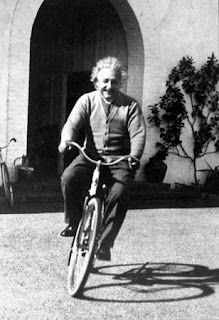Einstein letter sold at auction
 Fri, May 16, 2008
Fri, May 16, 2008 
A letter in which Albert Einstein dismissed the idea of God as the product of human weakness and the Bible as collection of honorable but "pretty childish" stories, has sold at auction in London for more than US $400,000.
Einstein wrote the hand written letter in German on January 3 1954 (A year before his death.) to the philosopher Eric Gutkind who had sent him a copy of his book Choose Life: The Biblical Call to Revolt.
The letter went on public sale a year later and has remained in private hands ever since.
Einstein, who was Jewish and who declined an offer to be the state of Israel's second president, also rejected the idea that the Jews are God's “Chosen” people.
He wrote, "For me the Jewish religion like all others is an incarnation of the most childish superstitions. And the Jewish people to whom I gladly belong and with whose mentality I have a deep affinity have no different quality for me than all other people. As far as my experience goes, they are no better than other human groups.”
Einstein’s parents were not religious but he attended a Catholic primary school and at the same time received private tuition in Judaism. This prompted what he later called, his "religious paradise of youth", during which he observed religious rules such as not eating pork. This did not last long though and by 12 he was questioning the truth of many biblical stories.
He later wrote, “The consequence was a positively fanatic [orgy of] freethinking coupled with the impression that youth is being deceived by the state through lies; it was a crushing impression”
In his later years he referred to a "cosmic religious feeling" that permeated and sustained his scientific work. In 1954, a year before his death, he spoke of wishing to "experience the universe as a single cosmic whole". He was also fond of using religious flourishes, in 1926 declaring that "He [God] does not throw dice" when referring to randomness thrown up by quantum theory.
John Brooke of Oxford University, regarded as a leading expert on the scientist, said. “His position on God has been widely misrepresented by people on both sides of the atheism/religion divide but he always resisted easy stereotyping on the subject.
Like other great scientists he does not fit the boxes in which popular polemicists like to pigeonhole him," said Brooke. "It is clear for example that he had respect for the religious values enshrined within Judaic and Christian traditions ... but what he understood by religion was something far more subtle than what is usually meant by the word in popular discussion.”
Despite his categorical rejection of conventional religion, Brooke said that Einstein became angry when his views were appropriated by evangelists for atheism. He was offended by their lack of humility and once wrote. "The eternal mystery of the world is its comprehensibility."
Footnote:
I post this piece because it is current, and because Einstein is one of my heroes. He was not only brilliant but he was “cool.” I also draw comfort from the fact that people disagreed with his views, and still do.
It serves to make me realize that if people argued with Albert Einstein, one of the greatest minds of all time, what chance do I have. A humble artisan who made a few bicycle frames.
People talk of “Reality.” What is that? You can point to the “Empire State Building” or “The Whitehouse,” and say, “That is reality.” However, when it comes to abstract things, like the mind, thinking, God, (whoever He, She, It might be.) I feel one should keep an open mind.
I think it is highly probable that people experience different realities. I do not mind that others disagree with me, but when people tell me outright I am wrong, I shake my head in amusement and say to myself, “Do you walk in my shoes, are you inside my mind, can you see what I see?”
Story USA Today
Partial translation of the letter
 Dave Moulton | Comments Off |
Dave Moulton | Comments Off | 

















Reader Comments (22)
"Where, Ben? Where is the world?" And Ben answered, "You are your world."
As to his theology - he's just as much a genius as the rest of us on something which is non-scientific and cannot be proved. That is, he happens to have an opinion which is no better or worse than any other person thinking about the subject. And this one writing may or may not represent the sum total of his thoughts/beliefs regarding the matter.
Finally - a little perspective. Einstein was a great thinker, teacher and doer, but he wasn't a great father, husband or, in many cases, a great friend.
He also said "Life is like riding a bicycle. To keep your balance you must keep moving".
Jack
I'm sure it was not your intention to infer that agnostics are bad fathers, husbands, and friends. Or was it?
Dave, it's a shame that many people will so easily disregard some of the things you say.
But it's not surprising. Thanks for the past few posts.
Faith is simply superstition which in the case of religion is institutionalized group superstition. In Christianity, it is based on a book that is anything but "non self-contradicting". And I'm not picking on Christianity in particular.
But let's get real, one serious read of Christianity's book is enough to turn any intelligent, reasoning human being away from "faith" permanently.
Religion requires "faith". Science requires no faith, only curiosity and an inquisitive mind. Sure, anybody who comes up with a theory will become attached to their idea and hope that it is never superceded by a better one, but no true scientist or a person with interest in science is always looking for better information and a better explanation of how things work. Theories are theories, they aren't fact revealed by some unknown power that nobody in the history of mankind has ever seen.
Personally, I was very happy to see Enstein's letter in the news again. It certainly puts the kibosh on the faith people who constantly misuse Einstein's word about god not playing dice with the universe.
Well said. Anon 9:50 makes a good point and perhaps not the one he intended, everyone's opinion on religion is equal. Referring to theology as something which is non-scientific and cannot be proved. It has no foot hold in reality other than what we impose upon ourselves in its name.
Ron is led astray by defining theory as hypothesis. A theory is a demonstrated and testable understanding of a function of the natural world that has been tested and proven. A current theory may be the final description of understand and can be the 'truth', if you define truth that way. But science, unlike faith, looks for and accepts change to gain a better understand. Being comfortable with uncertainty and ambiguity are the core to inquiry.
To close one's eyes to inconsistency and contradiction to cling to a dogma is to ignore the beauty, complexity and challenge of the real world.
Good post Dave. Thanks.
But, someone here says faith is superstition.
Superstition really has no logical,substantial basis. For example, "don't cross a black cat, or it'll ruin your day." Hundreds of others exist, and none of these have done any good to the world, nor moved anyone to do something good to another person : be it love, share (a bike maybe), inspire, encourage (to perhaps stop addiction for example) feed hungry and clothe millions...
Faith is a personal conviction of a supreme being called God, a spiritual purpose to one's life, it is a hope of things to come. You cannot share a Muslim faith or a Christian faith without experiencing something dramatic in your life, once, twice and even numerous times. Only you'll know why you believe. Hence, the word Testimony. It is backed up by a scriptures for many. For example, the Bible.
Sorry for the misunderstanding. I did not mean science requires faith. Thats against science. I meant those handful of folks who "theorize" about the origins of humans and this universe as a whole.
Veloben, since theories are 'demonstrable', try proving to us in the laboratory that fishes turned to humans and walked on land or the big bang created the universe. Now if you can't (no one has), why did you believe the certain someone who theorized that it did? Faith, or no faith? Thats my point here.
It is the second part of the quote that reveals the reason Einstein rejected the existence of a personal God. Einstein compared the remarkable design and order of the cosmos and could not reconcile those characteristics with the evil and suffering he found in human existence. How could an all-powerful God allow the suffering that exists on earth?
Einstein's error
Einstein's failure to understand the motives of God are the result of his incorrect assumption that God intended this universe as His ultimate perfect creation. Einstein could not get past the moral problems that are present in our universe. He assumed, as most atheists do, that a personal God would only create a universe which is both good morally and perfect physically. However, according to Christianity, the purpose of the universe is not to be morally or physically perfect, but to provide a place where spiritual creatures can choose to love or reject God - to live with Him forever in a new, perfect universe, or reject Him and live apart from Him for eternity. It would not be possible to make this choice in a universe in which all moral choices are restricted to only good choices. Einstein didn't seem to understand that one could not choose between good and bad if bad did not exist.
It's amazing that such a brilliant man could not understand such a simple logical principle.
-GodandScience
to judge whether something is the truth. No one has to blindly follow anything.
But if atheist is someone who does not believe in the insane mythologies that religions and religious people expect people to believe as the truth, then Einstein most certainly was an atheist.
No - it wasn't my intent at all. My real point was to respond to the media's (but not Dave's) focus that "Einstein is a soooper genius so he must be infallibly correct on everything, whether scientific, social, political or moral". The truth is, that when Einstein says something outside of his area of expertise, it is, of course, interesting and learned, but in the way that statements outside of the craft of acting are interesting when said by smart, interesting people such as Susan Sarandon, Sean Penn and George Clooney or statements outside the area of linguistics are interesting when said by Noam Chomsky.
I'm don't count myself as an agnostic, but many friends and family are and they are wonderful, caring, moral people. (Although I suppose that at some level, all believers in a Deity are agnostic in the true sense of the word - unless you receive direct revelation, there is no proof of a personal or indirect Deity - so there better be something more than mere "faith" that justifies the actions that you take in this world).
The point about Einstein being somewhat less than a "mentsch" in his personal life is to further the argument that he didn't have answers to everything; although I greatly respect him and love the photos of him bicycling, sailing, looking rumpled and sticking his tongue out - I wouldn't pay much heed to his musings about child-rearing or how to treat one's spouse - because he had no particular expertise in those matters (and, in fact, was more than deficient in that).
Moreover, unlike Einstein's scientific theories, some of his theories of religion were not his own - they were absorbed from his parents who were not religious, were completely assimilated into German culture, and referred to their ancestor's religion as "ancient superstition".
In addition, his views changed from time to time. Some have called him an atheist here. Here are his own words:
"I'm not an atheist. I don't think I can call myself a pantheist. The problem involved is too vast for our limited minds. We are in the position of a little child entering a huge library filled with books in many languages. The child knows someone must have written those books. It does not know how. It does not understand the languages in which they are written. The child dimly suspects a mysterious order in the arrangement of the books but doesn't know what it is. That, it seems to me, is the attitude of even the most intelligent human being toward God. We see the universe marvelously arranged and obeying certain laws but only dimly understand these laws."
Also: "The fanatical atheists," he wrote in a letter, "are like slaves who are still feeling the weight of their chains which they have thrown off after hard struggle. They are creatures who--in their grudge against traditional religion as the 'opium of the masses'-- cannot hear the music of the spheres."
The newly released letter is also nothing new to those who have read biographies of Einstein: "I believe in Spinoza's God, who reveals himself in the lawful harmony of all that exists, but not in a God who concerns himself with the fate and the doings of mankind." Also: "The main source of the present-day conflicts between the spheres of religion and of science lies in this concept of a personal God".
But neither did he believe in free will: "Human beings in their thinking, feeling and acting are not free but are as causally bound as the stars in their motions." "Everybody acts not only under external compulsion but also in accordance with inner necessity."
To sum up, Einstein is an interesting read outside of his scientific area of expertise - but since theology cannot be proven or even tested, and since he wasn't a real theologian, there is not much point in all the hoopla that is being given to his recently released words (which are not even new in ideas from what has been known about Einstein for many, many years) - other than to "Brittany Spearsicize" Einstein.
Anon 9:50
Bill echoes something very true. For many decades, countless tug-of-wars have been had between atheists and believers to get Einstein on their side. Lets not do that here again.
One of the past times of many have been the "redefinition" game of philosophy. Atheism is based upon a materialist philosophy, which holds that nothing exists but natural phenomena. There are no supernatural forces or entities, nor can there be any. Nature simply exists. Atheism believes that all beliefs should be open to question.
-- Carl Sagan, 1987 CSICOP keynote address